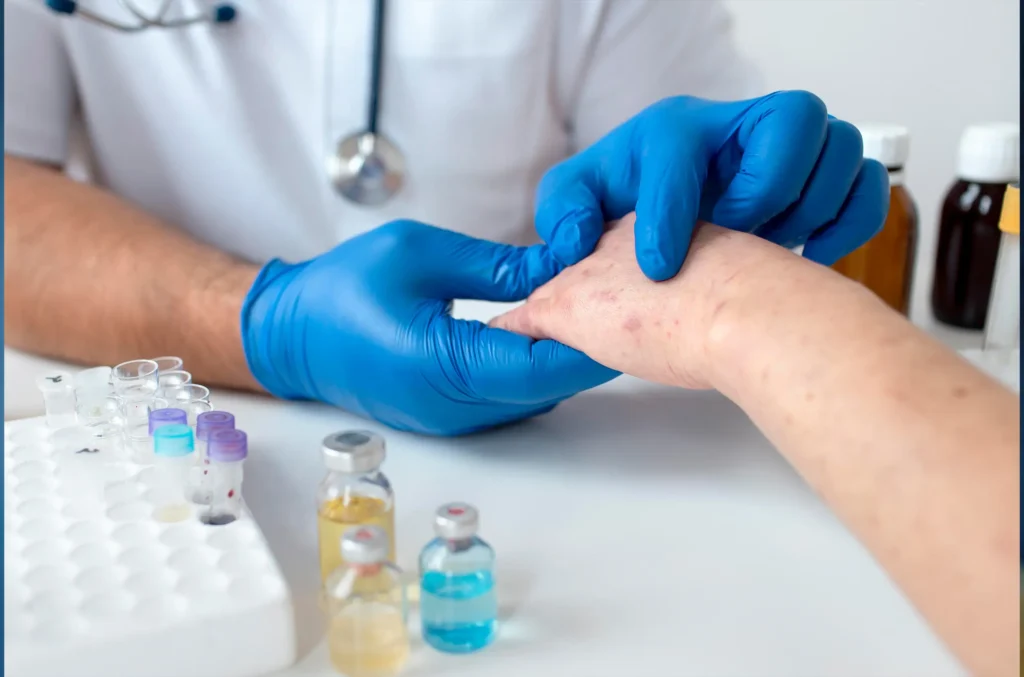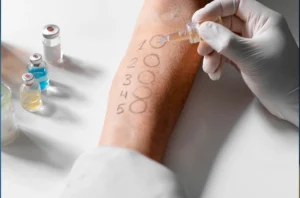Allergy Skin Testing
Allergy skin testing in children consists of applying minute quantities of potential allergens substances that might elicit allergic reactions to the skin, followed by careful observation for any signs of a response. This procedure aids in identifying whether particular substances that a child encounters through touch, inhalation, or ingestion are responsible for their symptoms. Such assessments are crucial for formulating effective treatment strategies and managing allergies in young patients, thereby safeguarding their health.

Why We Conduct Allergy Skin Testing for Children
- Accurate Diagnosis: It allows healthcare professionals to pinpoint the exact substances responsible for symptoms such as sneezing, itching, or skin rashes, facilitating a precise diagnosis.
- Customized Treatment Plans: By determining the triggers, clinicians can create tailored treatment strategies that may involve avoidance measures, medications, or immunotherapy.
- Enhanced Quality of Life: Gaining insight into allergens helps families manage and minimize exposure, leading to significant improvements in the child’s quality of life and overall health.
- Ongoing Allergy Management: Regular testing can help monitor changes in allergy sensitivities over time, ensuring that treatment approaches remain effective as the child develops.
- Informed Choices: Allergy skin testing provides critical information that aids parents and caregivers in making informed decisions regarding their child’s environment, diet, and activities.

Conditions Where Allergy Skin Testing is Not Recommended
- Active Skin Conditions: Children with ongoing skin disorders, such as eczema or psoriasis, may experience altered skin responses. These conditions can interfere with the accuracy of test results, making it challenging to interpret findings.
- Current Medications: Some medications, particularly antihistamines and certain corticosteroids, can mask allergic reactions. It is essential to consult with a healthcare provider regarding any medications that should be temporarily discontinued prior to testing to ensure reliable results.
- Severe Allergies: For individuals with a known history of severe allergic reactions (anaphylaxis) to specific substances, conducting skin tests can pose significant risks. In such cases, alternative diagnostic methods should be considered.
- Chronic Illness: Children with chronic illnesses or uncontrolled conditions, such as asthma, should undergo careful evaluation before testing. These conditions may affect their overall health and response to allergens.
- Very Young Age: In very young children, skin testing may not provide reliable results due to their developing immune systems. Physicians may recommend alternative assessment methods in these situations.
Allergy Skin Testing at Fayrouz Pediatric Clinic
At Fayrouz Pediatric Clinic, we offer comprehensive allergy skin testing specifically designed for children, ensuring a safe and effective experience. The process begins with an initial consultation to review the child’s medical history and symptoms, allowing us to tailor the testing approach. After preparing the child for the procedure, small amounts of potential allergens are applied to the skin using a gentle prick method. We monitor the skin for reactions, with results typically available within 15 to 30 minutes. Following the test, our healthcare professionals discuss the findings and recommend appropriate management strategies, including avoidance measures or medications.
In conclusion, Fayrouz Pediatric Clinic is dedicated to the health and well-being of every child we serve. By offering thorough allergy skin testing in a supportive environment, we empower families with the knowledge needed to manage allergies effectively. Our commitment to quality care ensures that children receive the best possible support.
Book an Appointment
Frequently Asked Questions
If you have any further questions or need additional information, please don’t hesitate to reach out. Best regards, Fayrouz.